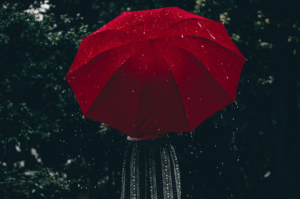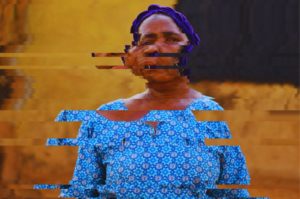
My mum was a devoted Nora Roberts reader. She would take me to Pánsèkè in Àbẹòkútà to buy or exchange her old Nora Roberts novels for new ones. She would also pick up books by other authors, though I mostly remember Nora Roberts and Jayne Ann Krentz — another romance and suspense novelist. I would accompany her, and we’d pick up books from a tall pile on the ground. I’d go home with about ten copies of Sweet Valley High books, Enid Blyton stories, the Stage School series and tons of the Mary-Kate & Ashley Olsen books. I’m convinced my mum once owned every single Nora Roberts novel ever published. She was — and still is — a serial romance reader. Naturally, she passed that love on to me. So, it is no surprise that Noisy Streetss’ debut print book curated African Detty December love stories. It was born from a desire to read more African love stories created from a concept bespoke to our shared and unique African experience, and importantly, for Africans like us.
Chinua Achebe is often regarded as a pioneer who spoke about using English as a medium to tell stories of his Igbo homeland — but in what he referred to as ‘new English.’ How else could it have carried the weight of his African experience while staying in full communion with its ancestral homes? Achebe’s goal was to craft a form of the language that would remain faithful to his roots while still engaging with the realities of a modern, globalised world. This ‘new English’ allowed him to tell the story of Okonkwo in Things Fall Apart, a story about the rise and fall of a respected leader in an Igbo village. The novel’s seamless integration of Igbo proverbs, phrases and cultural nuances into the English narrative was groundbreaking.
This approach is common among more serious pieces of work; however, I believe that even the simple African love stories and the romantic literature scene in general would benefit from adopting this approach. As Editor-in-Chief for the Noisy Streetss’ anthology, A Man and a Woman & Other Stories, I noticed that nearly every submission fell short of capturing the essence of African love, particularly the love that subsumes December. I struggled to find stories that captured the magic of December — the kind that sweeps across the continent — through the authentic use of African words. Initially, it was subtle — the language, the descriptions — but eventually, it felt as though the stories weren’t written for me, but rather for a western heteronormative audience. Many lacked details that resonated with my daily experiences as a young woman living in Lagos, Nigeria. When African writers write romance stories, do they write for us, or are their stories still shaped to meet western standards?
The unfortunate truth is that the yardstick for success in the African literary world often hinges on whether western audiences understand and appreciate the work. It appears that our stories will struggle to gain commercial and financial success without this. This pressure is rooted in the real experiences of many African writers, but how long must we continue down this path? There is a recurring lament by African fiction writers about the lack of readership within the continent. How can this be true? I was an 8-year-old who joined her mum in Pánsèkè to buy books. In fact, by 16, my goal was to have read all of Shakespeare’s works. I read tons of western romance novels because they were easy stories. Yet, I struggled to find simple, authentic African love stories featuring protagonists who looked like me and reflected my experiences. At Noisy Streetss, we aim to change that.
As African writers, we need to create love stories that speak to our daily experiences. Our male protagonists should woo the female characters in a way that reflects the ways of our culture, our words, our styles, and even our arrogance. These changes go beyond a paradigmatic level of word choice — they need to affect the structure, the setting and maybe the core of some of the stories we choose to tell.
African romantic fiction needs to be rooted in African realities. The Spatiotemporal setting — the place and time of the story — should reflect our environments. The characterisations of protagonists must mirror the complexity of our lives and the sociocultural background should align with the dynamics of our society, and must agree. These elements are not just decorative; they are essential to validating the romance and the love the writer is portraying. They create a world where this love story can thrive. There is a danger when we disconnect our characters from the very audience they are meant to resonate with. Who is telling our stories in their full and authentic manner?
From an essentialist perspective, African writers often write romance stories through a western lens because they assume that Western ideals of love, relationships, and marriage are universal or essential to a successful human experience. This reflects a belief that commercial success can only be achieved by meeting western expectations. As a result, African readers are positioned as passive recipients of western standards, reinforcing the colonial stereotype of African ‘barbarism’ and a supposed lack of modernity, creativity or authenticity in our own traditions.
This is what I would call literary imperialism — the dominance of western literary traditions that leads us to feel compelled to conform to western norms in order to succeed. It influences our themes, characters, and settings. While this process can stifle our creative storytelling authenticity, it also presents an opportunity for African writers to critique and transform our forms of storytelling, particularly romantic storytelling — resisting this literary hegemony. We can reimagine romance writing in a way that reflects our own identity.
Some African authors, such as Chimamanda Ngozi Adichie, Sefi Atta, and Damilare Kuku, have done this and are authors who we can model after. They’ve written to us and for us, incorporating our themes, values, and settings into their romantic narratives. Some of their stories may shock us and may contradict our understanding of what love is, or may even appear queer, but it is true to our stories. One of the books that shaped my thinking about Noisy Streetss was Love in the New Millennium by Can Xue. Although it’s set in contemporary China, Xue’s fragmented narrative, emotive language, and exploration of complex love and desire reveal how deeply a cultural context can shape the experience of romance. Xue’s work, despite its disjointed plot, presents love within the framework of Chinese society, showing that love can never be fully separated from the cultural and social structures that influence it.
With Noisy Streetss and our new anthology, A Man and a Woman & Other Stories, we hope to do just that — tell African love stories in our own voice, using our own language, words, and structures. We are forging a “new English” for African romance, one that reflects the authentic cultural and emotional landscapes of our societies. Our stories will honour the complexities and beauty of African love, free from the constraints of Western frameworks.
What is your story? Tell me — in the language and words that speak fairly to your experiences and its uniqueness.
Photo by ali nejatian on Unsplash










COMMENTS -
Reader Interactions